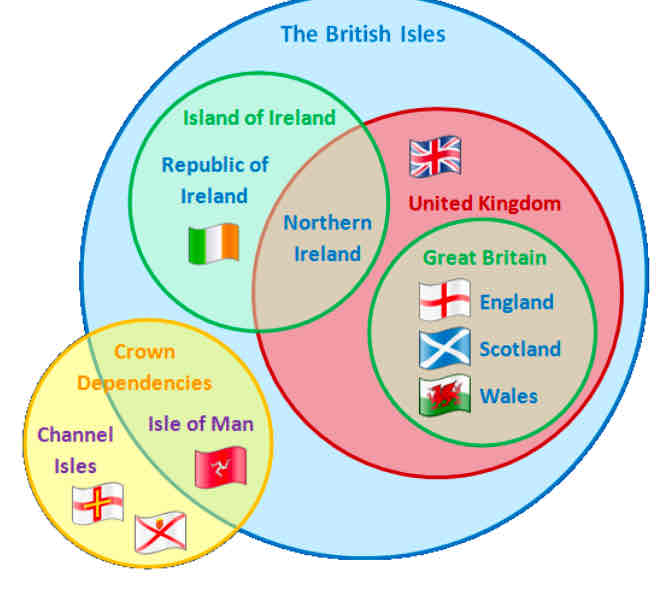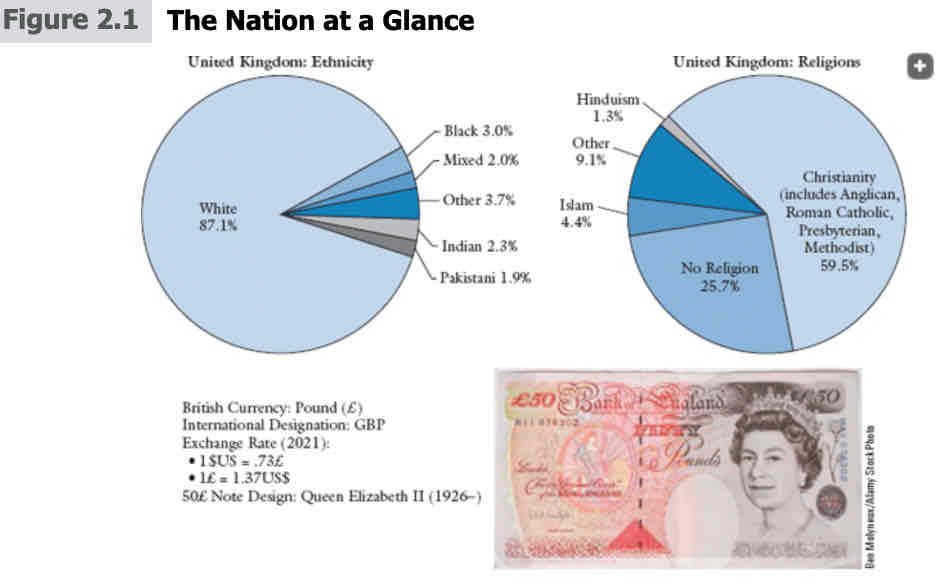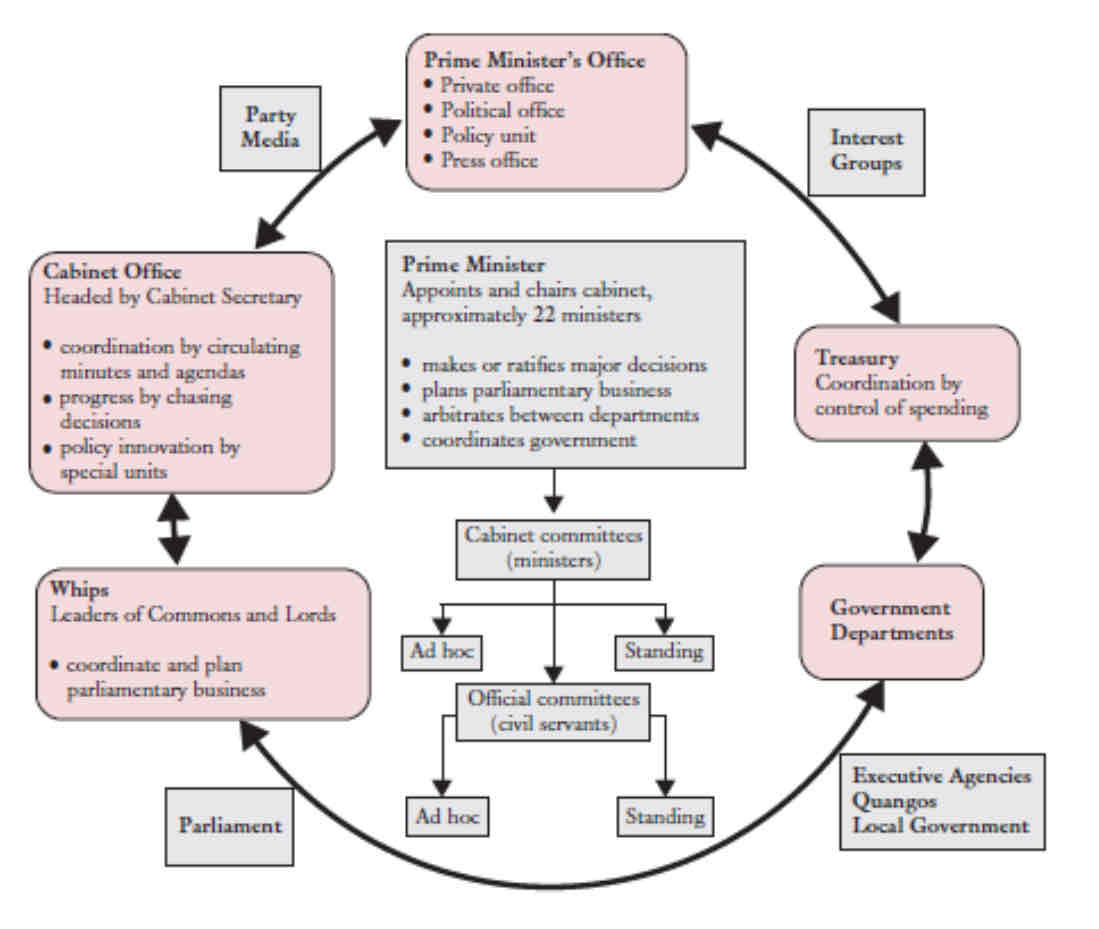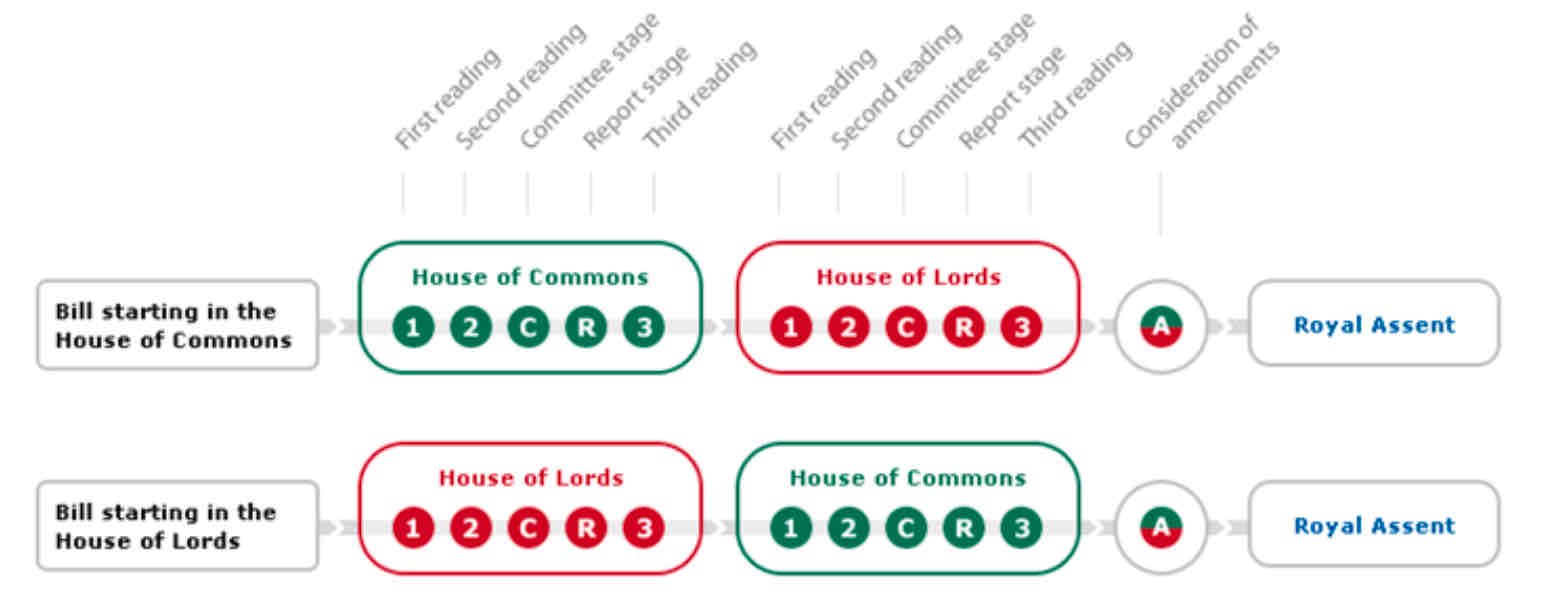Unit 6-The United Kingdom
Topic 6.1
How did the history of the British empire influence the political systems in place in the United Kingdom today
What forces, both in the UK and abroad, conspired to lead the UK to exit the European Union (EU) in 2020?
The term “Great Britain” includes England, Wales, and Scotland, but not Northern Ireland.
College Board uses the term Britain as shorthand for the United Kingdom of Great Britain and Northern Ireland.

Critical Junctures:
The Consolidation of the British State
The Seventeenth-Century Settlement
The Industrial Revolution and the British Empire
Economic Empire
Industrial Change and the Struggle for Voting Rights
World Wars, Industrial Strife, and the Depression
Collectivist Consensus (post WW2)
New Labour’s Third Way
The Conservative - Liberal Coalition
Brexit

Topic 6.2
Political economy: the intersection of government or policy into the economy
Liberal: more government intervention (closer to the concept of Keynesianism)
Conservative: Monetarism
State and economy:
Economic Management
The Consensus Era (Keynesianism)
Regardless of where they were on the political spectrum, they reached an agreement about the need for high level of government intervention in the economy
expansion of social services (the provision of education, healthcare, income, food) and welfare
More state intervention in controlling unemployment, inflation, etc. (government became more controlling)
If you were to put a bowl outside in the rain and said 2 cups of water in here is the perfect amount, the free market would allow the rain to fill it up and evaporation to let it lower
Intervention is when you would pour it up or fill it up to get the desired amount
1960s-1970s (beginning of labor issues): government nationalized key industries (coal, mining, trucking, etc.) —> sentiment against government intervention rose (1970s)
Deficit was rising higher, labor rights, pay, etc.
Thatcherite Policy Orientation (Monetarism)
Margaret Thatcher: dramatic swing in the other direction
Conservative prime minister
Served for 10 years
She represented a new age of conservatism in the UK —> monetarist (less interventionist)
The British female Ronald Reagan
New Labour’s Economic Policy Approach
Tony Blair: new leader of the Labour Party and invented new labor
New Labor: supported the more investment on social services —> higher taxes and debt (need to raise more money to give out more money)
Need to find a way to fundraise a robust social service state
persisted through Tony Blair and his chancellor of the exchequer (Gordon Brown)
Gordon Brown: Blair’s chancellor of the exchequer —> prime minister
The Coalition Government’s Economic Policy
Many European countries put austerity measures into place (to cut spendings, typically social programs); not IMF austerity measures
Portugal, Greece, Italy, and Spain got IMF loans during the Great Recessions
New Labour Becomes Old Labour Once Again
Johnson Withdrew from the European Union
Social Policy
Compared to the rest of Europe
EU: free education, maternity leave, paid vacation, etc.
UK: does not provide as many
National Health Service: government funded healthcare of the UK
NHS is typically underfunded and has issues
The second a politician tries to touch the NHS they are done
Similar to social security in the US
Society and Economy
Inequality and Ethnic Minorities
20% increase in the number of Britains who have a parent show as a foreign born citizen (constantly increasing)
1/3 to ½ have a parent not born in the UK
Diaspora is primarily from Africa and Asia —> mixed populations
Higher rates of crime and lower rates of education in these communities
Inequality and Women
wage gap between men and women in the UK (15% of a wage gap)
Gap is larger in part-time work (more men work full time)
Over 40% of women in the UK are employed in part-time roles
Environmental issues
Acid rain: pollution gets into our ecological system
Coal-fired plants
Fracking
Food safety: the UK (and a lot of Europe) banned a lot of things that are legal in the US (i.e dyes, preservatives)
“Green” vs. anti-regulatory bias
Britain’s economic policies/political climate encourages foreign direct investment
Political and economic climate that wants countries to invest in the UK
London is one of the finance capitals (similar to Shanghai or New York)
Near the North Sea (key energy producing sector of the world)
Comparatively strong microeconomic and growth competitiveness
Topic 6.3
Organization of the State
Parliamentary Sovereignty: none of Parliament’s actions can be checked by other balances
Their judicial review is not able to overturn parliament
Parliamentary supremacy
No check on the actions of parliament
Parliamentary Democracy: they hold elections for the executive, the people don’t directly elect the prime minister, the prime minister can be dismissed by the legislator
Presidential democracies have executive and legislative branches separate (elected separate), check on the executive
Parliamentary democracy the executive comes from the legislature and it’s easier for the legislature to remove the executive
Unitary State: the central government (federal) has all of the power, none guaranteed to the subnational units (but they can give or take it away)
In a federal state: power cannot be taken away from subnational units
Fusion of Powers
Presidential system! More likely for divided government
Parliamentary system: Elections for the legislator, the winning party for the legislator, their party would be asked to form a government. Once the prime minister is asked to form a government by the monarchy, they will create their cabinet which has to be members of parliament; hint the fusion of powers (legislative and executive are fused)
When the parliament and executive are in sync, things happen quicker in government (less disagreement); fusion of powers speeds this up
Cabinet Government
Similar to the US
When the Prime Minister appoints their cabinet, the person who is in charge of that division is the cabinet secretary (political appointee who heads the department)
Permanent Secretary: each department has one; high ranking career civil servant (not an appointee) and is the second in charge in these divisions
The secretary of home office: attorney general and dog
Chancellor of the exchequer: treasury
Cabinet members serve in parliament
Constitutional Monarchy: the monarch has limited powers
in the UK, the last step of a bill becoming a law is royal ascent, the king has to agree to it
when an election happens, the monarch asks the leader of the party to form a government in his name
All of the things that are done in the monarch’s name are done by an actual government, the monarch itself isn’t ruling, it’s the elected government that’s running the country in the name of the king
The executive
Cabinet Government
Bureaucracy and Civil Service
Tends to be a large group of people who are career civil servants (foreign service, diplomats, judges, etc.)
Career civil servant: Anyone who is serving this government function as a career
Public and Semi-Public Institutions
Happened during the Consensus Era (lots of nationalization happen); Thatcher emphasized privatization
Nationalized Industries
Non-Departmental Public Bodies (quangos/quasi non-governmental organizations): a governmental organization that is not a governmental organization; an organization that is formed, the function is sanctioned by the government, the government may fund it, the government isn’t running it or taking responsibility
If there is an area that is unpopular, controversial, or demands independence where you don’t want the government running it, you form a quango
Examples: some regulatory bodies, certain watch groups (anti-corruption)
Other State Institutions
The Military and the Police:
Britain used to be the strongest military (naval)
Nuclear Triad: submarines launch ballistic missle, icbm, bombers (ways to launch nukes)
The UK has this
Blue Water Nsvy: deep sea navy
Royal Airforce
Army
Since WW2, there hasn’t been any fighting on UK soil
The UK has played a large role in NATO
fall of Soviet Union, no competing organization to NATO (Warsaw Pact dissolved)
Missions in Kosovo, Balkans, Afghanistan, Iraq, Libya, etc. wanted to promote democracy and western ideals (resources, troops, etc.)
The Judiciary
Didn’t have a Supreme Court til 2009
No judicial review
2 functions: identify violations of common law and previous things Parliament has passed
Supreme Court can rule on these acts
Subnational Government
England, Scotland, Northern Ireland, and Wales
Tony Blair’s New Labour put a series of reforms into place that tried to inshrine more power in subnational units to appease them (they wanted independence, instead they got more autonomy and authority)
Focus is on Whitehall: colloquial term for Parliament and the agencies
Focus on the actual cabinet part of government

European Union Policy
6.4
The legislature
The House of Commons (lower chamber)
The House of Lords (upper chamber)
The Legislative Process
Structural Changes: Parliamentary Committees
The House of Commons
The Commons has a limited legislative function. However, it serves a very important democratic role by providing a highly visible arena for policy debate and the partisan collision of political worldviews.
Cabinet is main policy maker because the prime minister is MP and cabinet members are also part of parliament
The House of Lords
The Lords serves mainly as a chamber of revision, providing expertise in redrafting legislation, with the power to suggest amendments to legislation in the Commons.

Political Parties and Party Systems
House of Commons:
The Labour Party (402 seats)
The Conservative Party (121 seats)
Liberal Democrats (72 seats)
Scottish National Party (9)
Democratic Unionist Party (5)
Plaid Cymru (4)
Social Democratic and Labor Party (2)
Alliance Party (1)
Green Party (4)
Reform UK (5)
Independent Alliance (5)
Independents (10)
Sinn Féin (7)
House of Lords: typically leans Conservative
Topic 6.5
Generational Divide in British Politics
Not dissimilar to the US
Older (Conservative) vs. Younger (Liberal)
Change in traditional values, awareness of monarchy, change in Britain’s international position, wealth, policy issues
Somebody who is nearing retirement is going to have more accumulated wealth compared to someone who is just graduating college
Challenges of Multiethnicity
Number of countries in Europe, large influx of immigrants (mostly from Middle East countries)
2011: Arab Spring; large population of people who left the Middle East and North African countries —> Europe (strains systems; I.e. healthcare, housing, education due to an immediate large influx)
Multiethnicity is people who are of mixed ethnicity
The US was very ethnically homogenous (Caucasian with European ancestry)
In the UK, the large South Asian diasporas have led to more people of mixed descent —> increase in diversity and social cleavages (similar to Nigeria)
Important Social Cleavages
Populism (common man vs. elite)
Wave of populism around the world since 2008 (Financial Crisis of 2008)
Populism is not tied to a left or right side (far range)
Germany, France, Austria, Hungary: good examples of right winged populist
Scandinavian countries: left leaning populism
Nativist message; argues in favor of average person who is from the place of origin (pro-labor, anti-immigrant)
populism in the UK can manifest itself as being isolationist and anti-immigrant
Euroscepticism - “us vs. them” mentality
Native Britains vs immigrants; the island vs mainland Europe
Britain is different from everyone else, had a good empire, English is spoken everywhere, great history… why are people interfering?
Pre-WW2, Britain was isolated
Fueled by the European Union/Brexit
Pushes for Constitutional and Governmental Reforms
Britain does not have a written constitution, it is a collection of laws from the Manga Carta, acts of Parliament, previous decisions
2009: Supreme Court (took the power away from the House of Lords)
Succession and titles in the Royal Family
Most constitutional and governmental reforms would be considered modernization
Economic, social, labor policies
Relationship between Britain and Scotland, Northern Ireland, and Wales
Successionist movements